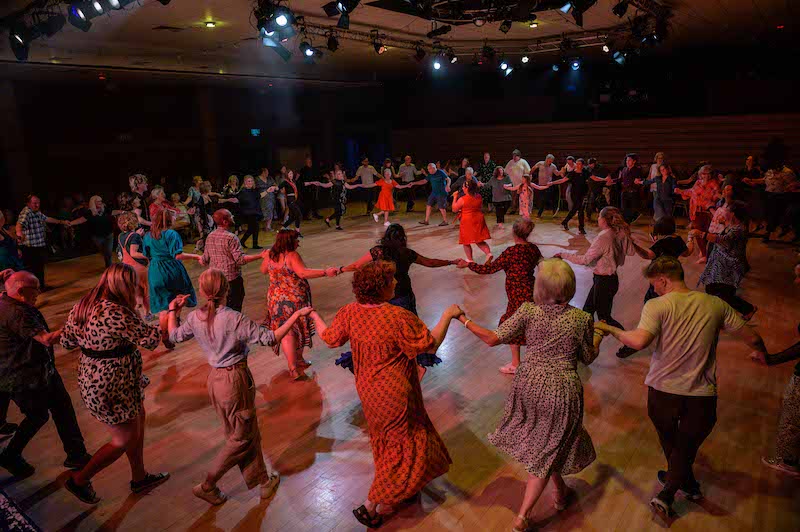Devisers and Writers: Alexander Scott, Clare Beresford, Conrad Murray, Deepraj Singh, Dominic Conway, Eugénie Pastor, Isabel Adomakoh Young, Miriam Gould and Shamira Turner
Director: Dominic Conway
It’s Saturday night, and it’s time for people who’ve never previously attempted a particular style of dance to have a go. No, this isn’t Strictly Come Dancing, but theatre company Little Bulb’s attempt to introduce audiences to more social forms of dance, from disco to Ceilidh.
But while Listen Dance shares a sense of joy with Little Bulb’s other shows, calling it theatre is a stretch. Each new style of dance is sometimes introduced with a cast member talking about, even recreating, their first encounter with the form, but that’s really the closest the show gets.
Instead, the focus is on encouraging participation. “We’re not professional dancers – but we’ve had a practice,” is one of the opening phrases. While the company provides a live band for each musical style, one member comes forward to lead instruction. For some sequences that involve a series of short moves, as seen in the disco, rock ‘n’ roll, and house music segments, the audience is then allowed to freestyle for a period.
On others, there is more organised choreography that requires a permanent caller. For the Ceilidh segment, Alexander Scott guides the audience through a variation of “Strip the Willow,” instructing couples to spin with their partners and then down the set of other couples. While it’s the type of dance that looks amazing when executed perfectly, it’s also one that gets more fun the more chaotic it becomes.
The longest segments are those devoted to the more intricate dances. Isabel Adomakoh Young leads the floor in the Electric Slide, a funk-based line dance also known as the Candy Dance due to its use with the Cameo song of the same name in a 1999 film. That’s gentle (and short) compared to guest artist Laurie Kirwan-Ashman, who runs monthly queer line dancing night Strut, leading everyone with a long, multistage boot-scooting boogie routine that comprises many of the basic line dancing steps. The teaching is slow, but fun, especially once the tempo picks up as the song (Pitbull and Ke$ha’s Timber) is played in.
Participation is encouraged but not compulsory. Indeed, as Miriam Gould explains as she relives her bat mitzvah through teaching the hora, there is also a role for “sitting outside the circle and then judging.”
Mostly, though, it’s just an excuse for endorphin release. There may not be a jot of theatre on display during Little Bulb’s evening, but it sure as hell beats sitting at home on a Saturday night watching an Apprentice contestant mangle the jive on Strictly.
Reviewed on 4 October 2025
The Reviews Hub Star Rating
